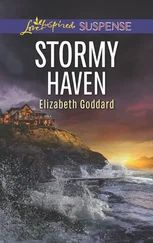But there was work in the East Texas oil fields. Jeanine’s father drove loads from the railhead out to the field at ten dollars a load, and then fifteen dollars and then twenty dollars as the drilling became more intense and the immensity of the oil strike became apparent. The excitement of it gave him a merry, lunatic air. At one drill site, gas came up out of the mud of the slush pit in bubbles the size of baseballs. Jack Stoddard and the crew amused themselves while he waited for his load by throwing matches at the bubbles and watching them explode. He told Liz and the girls it wouldn’t be long before they had them their racehorse. He stopped drinking. He said he did not have a drinking problem, the problem was the hangovers. So he moved on to gambling instead and lost money stone-cold sober.
While they lived in the Crazy House their Tolliver grandparents died within days of each other from pneumonia that many people said was caused by the dust, and Uncle Reid ran off and left Aunt Lillian and cousin Betty. He went north somewhere, maybe to the Oklahoma field, and nobody ever heard from him again. Jeanine realized people you love could disappear. This opened a hole in her universe, some illusory backdrop had torn away and beyond this an unlit waste and she could not see into it. She had a difficult time putting this into words to herself and so she sat with her fists against her eyes as they drove back to Central Texas, looking at the sparks against the dark of her eyelids.
They buried their kin in the old Tolliver graveyard, standing among a crowd of neighbors with heads bowed to hear the Methodist minister say I am the resurrection and the life while his tie fluttered in the hot, dust-laden wind. Little Bea was not allowed to come to the graveside because children should not be burdened with these things more than necessary or maybe the thinking was that if they were exposed to such things at a tender age they would become indifferent. Bea and a little redheaded neighbor girl had to stay inside the house where they sliced up the funeral bread and ate all the sugar and butter.
The older children gathered on the front veranda afterward to get away from the grown-ups who were suffering through emotions that the children could not help or allay and so they all sat and fooled around with telephone line insulators. There was a boy named Milton Brown and he was not related to her but to some neighbors. He wore a suit and steel-rimmed spectacles. He stuttered so badly he sounded as if he were trying to speak in Morse code.
Jeanine turned up one of the glass insulators and put it over her nose and her cousin Betty laughed and then stopped laughing and cleared her throat.
“We went to school t-t-together,” Milton said to Jeanine. “I sat in front of, uh, you and stuttered.”
“I don’t remember you,” said Jeanine. She said it in a mean nasal voice around the glass insulator.
“How could you forget!” He seemed to speak better if he shouted. “I’ll remind you of it someday.”
He got up in a jerky way and went inside; he left Jeanine and her cousins feeling bad about themselves in a way that was not repairable at the moment. Jeanine turned to her cousin and then didn’t say anything, but got up and walked into the silent house after him. Milton Brown was sitting in the parlor in front of the Atwater Kent radio and watching the little balls inside the glass battery drift up and down while the Carter family sang “I’ll Fly Away.” He sat in a chair backward, his chin was on his forearms.
“B-border radio, Jeanine,” he said. “Hundred thousand watts, you can get it in your bobby pins in Del Rio. Yow.”
Through the nine-foot parlor windows she could see to the veranda where her cousins sat and turned the blue-green glass knobs over in their hands and the glass glinted in the hot air. When I die, Hallelujah bye and bye, I’ll fly away. From beyond the central hall she heard the sound of a man walking across the kitchen floor, and the tick of a dipper lowered into a white enamel water bucket. For one second she thought it was her grandfather, but it was not, nor would it ever be again. She suddenly remembered one slow, dark evening when she and her grandfather and her father and Uncle Reid had walked down to the barn lot to see the work team. She did not remember when it was, or why they had come to visit, only that it was the most peaceful memory available to her. She had felt safe and secure with her hand in her father’s, and the men talking, the work team calling out to her grandfather in low tones, the warm good smell of harness and grass hay. The tears poured from between her fingers and she began to cry with quiet, strangled noises. Milton Brown sat absorbed in the radio noise and did not hear her.
IT WAS THE last time she saw the old Tolliver farm for many years. It remained in Jeanine’s imagination a kind of lost kingdom far to the west of them, the old house guarded by Spanish oaks and one great live oak and the Brazos River running green and twisted far below. The scaling bark of the peach trees that had been left unpruned and uncared for, birds’ nests in the chimneys. The land shriveled in the dry heat. She was left with the confused idea of her grandparents, now buried in the Tolliver graveyard, as sailing away in the strata below them to a place of great joy, buoyed on underground streams of oil.
IT WAS IN East Texas that her father began to gamble with intent seriousness, there in the outwash of people who had come seeking work in the oil fields as the Depression bottomed out. Jack Stoddard was like a juggler tossing up jobs and dice and racehorses and ladies of the night. Sometimes he caught them all in order and sometimes he forgot where they were or that he did not have enough hands.
They moved twenty miles south to Kilgore. Her father made up his mind to move the way birds made up their minds in midflight, wild, startling shifts that sent them spinning away through the vagrant airs to yet another oil field. They carried their cardboard boxes through a piercing cold norther into another tiny rent house of board-and-batten. Close by was the chugging of a ditching machine biting through the dirt to lay a line of narrow production pipe. Some other family that lived there before them had blocked the holes in the walls with old corsets and underpants, and Mayme said whoever it was must have abandoned the place stark naked with their tits flopping loose and she and Jeanine laughed until they could not catch their breath.
It came to Christmas Eve of 1932; next door to them, another family lived in an abandoned engine shed. They were a foreign people and they sang Quanno nascette ninno a Betelem me, E rannote pa vea meizo journo… There was no money for presents so Jeanine and her older sister Mayme and Bea, who was eight, decided to sing to their mother and father. This would be their Christmas gift. In those days most people could sing unaccompanied, and the greater part of the time they had to. The sisters meant to sing Christmas carols or comic songs, but the songs that occurred to them were old melodies of terrible sadness, songs that came to the girls without thought. They sang O Shenandoah, I love your daughter and If I had the wings of an angel, over these prison walls I would fly. They could not stop themselves, they were caught up in a descending chute of music that mourned aloud for all the Christmases unattended and wandering people who could not find their way home. They sang “A Shanty in Old Shanty Town” and at last they slid into the atonal hills song “The Three Little Babes,” this last a most terrible ancient lament as old as Scotland itself. It was a Christmas morning, when everything was still, and the ghosts of the three dead children came running down the hill. Jeanine could not finish it. Their father was attentive and silent over his coffee and their mother put her hand to her face and wept.
Читать дальше












